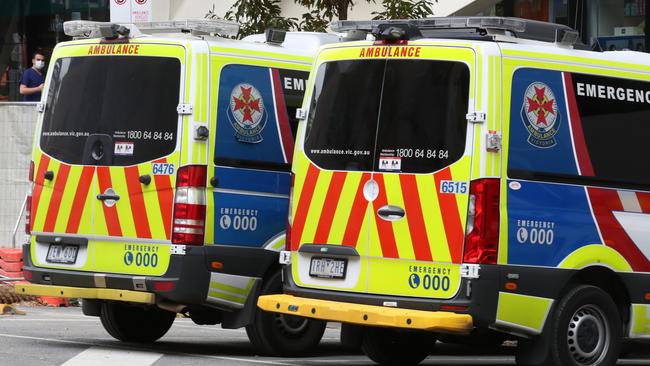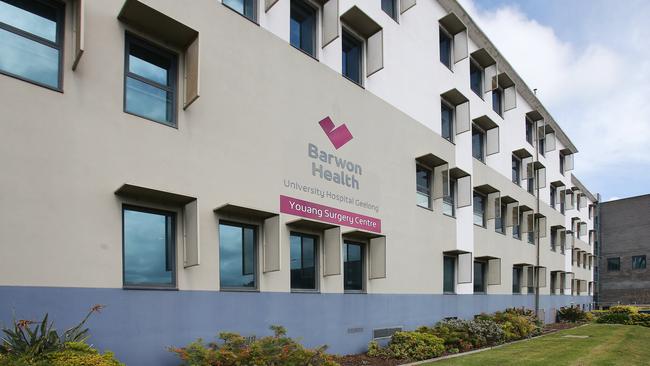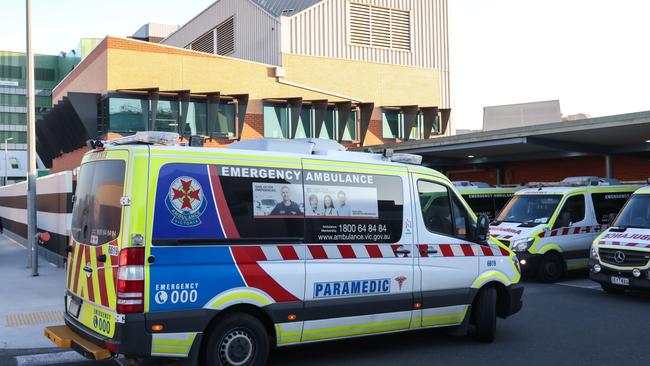Victorian Health Department slammed for failing workers’ mental health
Victoria’s health department has been blasted for failing to protect healthcare workers’ mental welfare, while three hospitals have come under fire in a damning report.
Victoria
Don't miss out on the headlines from Victoria. Followed categories will be added to My News.
The state’s watchdog has slammed the health department and three Victorian hospitals for failing to protect healthcare workers’ welfare as mental injury claims skyrocket.
A damning report into employee health and wellbeing in Victorian public hospitals found it had “deteriorated” since 2019 and the department did not have effective oversight on whether hospitals are protecting their staff.
The three services reviewed — Austin Health, Barwon Health and Central Gippsland Health — all failed their audit.
The Victorian Auditor’s General Office review said the department has no idea of the “actual state” of healthcare employees’ wellbeing “at a given time”, or whether hospitals were supporting said employees, due to a lack of timely data.
It also criticised their failure to properly track the outcome of government-funded projects to improve workers’ wellbeing, and said while the services were “positive steps”, the health department does not not “fully understand” if the projects actually work.

The report said workers’ compensation claims for psychological injuries had failed to return to pre-pandemic levels and claim’s average cost had skyrocketed by 45 per cent from $130,574 in 2019 to almost $190,000 last year.
“In 2020 the sector (healthcare and social assistance) accounted for 29 per cent of all psychological injury claims but only 15 per cent of all hours worked in Victoria,” the report said.
“Many of them do not return to work. This puts more pressure on other workers to fill staffing gaps.”
It revealed that 70 per cent of healthcare workers had experienced “aggression, violence or abuse” from patients — with nurses and midwives most at risk - and more than 60 per cent of workers felt they were short-staffed “most or all of the time” between 2020 and 2022.
The results - from a 2022 survey of almost 4,000 workers across public and private healthcare — also found a shocking 37 per cent reported “aggression, violence or abuse from their management or leadership”.
The VAGO audit revealed Austin Health, Barwon Health — which runs University Hospital Geelong — and Central Gippsland Health and could not show they met key legal requirements for managing the issues of fatigue and occupational violence.
The report found while they had “some processes” for these issues there were “gaps”, with examples cited including a lack of longer breaks between shifts and a failure to analyse staff hours for fatigue risks.

Occupation violence issues included their failure to acknowledge underlying issues when reporting incidents to management and the board, “such as a staff shortage leading to long waiting times and a patient becoming aggressive”.
“This limits the audited hospitals’ ability to proactively manage these risks,” the report found.
“Staff we spoke to during the audit told us that . . . there is a general acceptance and tolerance of low-level psychological stressors in their workplace, such as occupational violence and aggression, because staff feel it is part of their job.”
One in four Victorian healthcare workers who responded to the People Matters Survey last year said they were experiencing “high to severe stress”, compared to 19.8 per cent in 2019.
The spike “coincides with the height of the pandemic” and 71 per cent of respondents experiencing high to severe stress said their workload was to blame.
In 2022, four in ten healthcare workers told the People Matters Survey they were burnt out, including almost half (48 per cent) of all nurses.
“Staff working in emergency and maternity care reported the highest level of burnout (both 54 per cent,” the report said.
“When staff feel burnt out it puts the safety and quality of care they provide at risk.”
The VAGO pointed to a 2020 Australian Medical Association survey, where 47 per cent of junior doctors reported making a clinical error because of fatigue.

The report said audited hospital timesheet data shows that across all full-time employees, staff did “not work significantly long hours or unsafe work schedules between November 2019 to July 2022”.
But once broken down by occupation, VAGO found 60 per cent of doctors’ fortnightly roster’s put them at medium or high risk of fatigue (excluding at the Austin Hospital where doctor data was not available), followed by 38 per cent of nurses.
They said this was mainly due to working long shifts or having short breaks between them, as opposed to the total number of hours worked that week.
But they said they cannot “confirm that staff did not work additional hours beyond what they recorded in their time sheets” and the mental and emotional exhaustion of work — as opposed to simply the number of hours — can cause fatigue.
The VAGO made three recommendations, calling on the health department to develop frameworks to monitor hospital employees’ wellbeing and the outcome of hospital wellbeing programs they fund.
The last recommendation — given to Austin, Barwon and Central Gippsland Health — was for them to develop a framework which identifies psychological hazards, has a better practice process for managing the risk of fatigue and workplace violence, better data monitoring on the issue and more.
A response from the health department, attached to the report, said they accept the recommendations and the wellbeing of Victorian public hospitals was a “key priority” for the department.
Austin Health, Barwon Health and Central Gippsland Health all accepted the recommendation for their hospitals.




